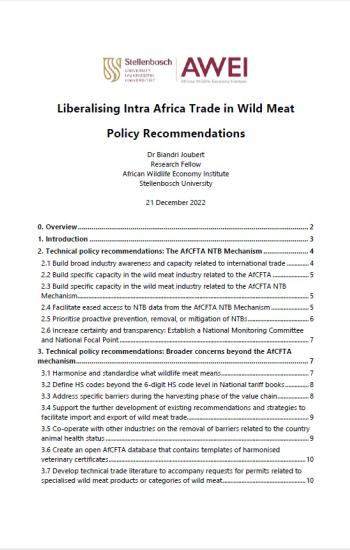
Liberalising Intra Africa Trade in Wild Meat - Policy Recommendations
This research considered the AfCFTA NTB mechanism as an appropriate forum of dispute resolution for the barriers identified as within the scope of this research. This research aimed to develop policy recommendations that have the potential to effect actual change in the industry. It was initially assumed that the recommendations made would be limited to technical improvements of the mechanism itself. However, through the course of the research and in particular during the consultations phase, it became apparent that there is a limited engagement with the NTB mechanism in the wild meat industry.
The policy recommendations reflect the critical need for technical co-operation and open information available to stakeholders as well as specific capacity building in the wild meat industry. The recommendations related to the NTB mechanism are largely capacity related and on account of the limited engagement on the matter from stakeholders there are limited technical recommendations in terms of improvement of the mechanism itself. Given the importance of recurring themes and barriers in the research, recommendations are made regarding the broader barriers identified in the research that are not directly related to the purpose and scope of the AfCFTA NTB mechanism.
Joubert, Biandri. (2022). Liberalising Intra Africa Trade in Wild Meat - Policy Recommendations. African Wildlife Economy Institute, Stellenbosch University.
-

Dr Biandri Joubert
Research Fellow
We support the free flow of information. Please share:
Form coming soon
More content
-

What Foot and Mouth Disease-free means for South Africa’s game meat trade
Ms Lydia Daring Bhebe…Explore the latest developments in South African provinces achieving and maintaining Foot and Mouth Disease (FMD) free status…
Articles -

The world wildlife trade regulator is 50 – here’s what has worked and what needs to change
Daniel Challender…Most countries implement Cites, the Convention on International Trade in Endangered Species of Wild Fauna and Flora as…Articles -

Enabling Sustainable Wildlife Trade
Prof Francis VorhiesEnabling sustainable wildlife trade is a key policy measure for growing Africa's wildlife economy. In this respect, CITES…
Articles -

Has CITES become too complicated to be effective?
Prof Francis VorhiesGovernments agreed to the text of CITES in the 1970s, which is quite straightforward. However, the agreement’s implementation…
Articles -

From poachers to providers: Can Africa's wild meat market save wildlife?
Dr Wiseman NdlovuHave you ever considered how wild meat could be more than just a cultural staple but also a…
Articles -

As a fellow of the African Wildlife Economy Institute (AWEI), I am excited to attend the upcoming 3rd…
Articles -

A theory of change to improve conservation outcomes through CITES
Dr Michael 't Sas-Rolfes…Here we articulate the implied theory of change (ToC) underpinning the design and operation of CITES (Convention on...
2025Research -

Wild Meat Value Chain Integration Systems: Opportunities for Value Chain Formalisation and Scaling in Africa
Dr Wiseman Ndlovu…Establishing a legal, safe and sustainable wild meat sector promises to potentially reduce demand for illegally sourced meat...
2025Research -

AWEI's 2024 Wildlife Economy Dialogue Series
Ms Emily TaylorRediscover 2024: A year of insight and inspiration
In 2024, AWEI proudly hosted three ground-breaking dialogue series in…
Articles
Get updates by email
Through impactful research, stakeholder engagement, and professional development, AWEI is supporting the wildlife economy across Africa. Please subscribe for occasional updates on our work and forthcoming events.
Sign up for a quarterly dose of AWEI insights
In a complex and changing world, AWEI generates strategic ideas, conducts independent analysis on wildlife economies, and collaborates with global scholar-practitioners to provide training and expertise for biodiversity conservation, climate resilience, and inclusive economic opportunities in Africa.
